How GOP-linked PR firms use Google’s ad platform to harvest email addresses
Ahead of the 2020 elections, a homegrown take on a familiar playbook.
This article was produced in partnership with Point, a YouTube channel for investigative journalism.
What's the seventh largest purchaser of US political ads on Google right now?
After the Republican Senate and Congressional Leadership Funds and the Trump campaign, comes a group called DedicatedEmails.com –- a limited-liability company specializing in digital marketing for clients looking to attract new customers via "opt-in email lists".
It also owns and runs a supposed news site called Conservative Buzz and, under that banner, it's been running Google Ads like this:

Which lead those who click on them to webpages like this:
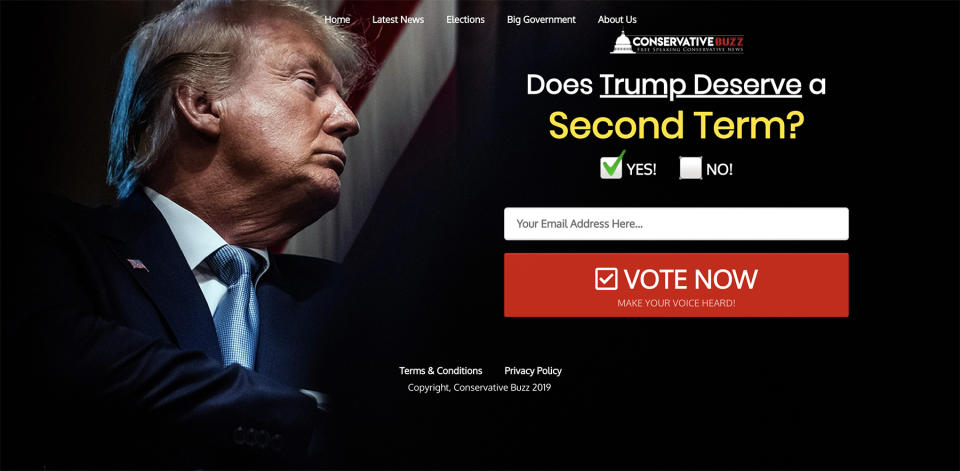
The ads appear to be geared towards collecting potential voter email addresses and directing people to questionable news sites. The emails people receive after signing up are either miracle health cures, secret new ways to boost your income or scary news about savings and the latest socialist coming to take them.
According to Google's political advertising transparency report, DedicatedEmails.com has spent over $3.5 million on more than 3,400 Google ads like the one above to date -- promoting poll questions that ultimately ask for email addresses. And it's not the only company doing this.
In a joint Engadget and Point investigation, we found at least three companies actively placing these types of ads connected to incendiary 'news' sites, one of which is run by a Republican donor and another that was registered by a former Trump campaign lawyer.
The sites connected to these ads either regurgitate news from other sources or push out stories like this:
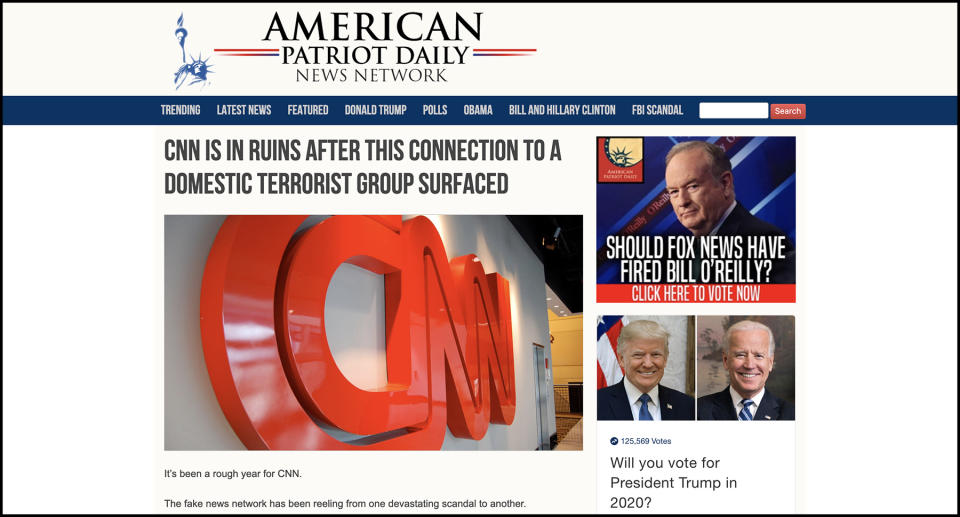
The blurry line of fake news
One of the main tactics Russia's Internet Research Agency (IRA) used to disrupt the US election in 2016 was to create Facebook pages and news sites meant to look like reputable media organizations, with names like World News Daily Report or abcnews.com.co.
In a similar vein, the three companies we found -- DedicatedEmails.com, Ascension Marketing Group, Inc. and Digital Communications LLC -- are running ads for news sites or a network of news sites, as is the case with the latter company. While not everything these sites post is false (making them hard to categorically call fake news), their headlines and content seem to serve a political agenda.
DedicatedEmails.com's site Conservative Buzz seems mostly to post articles with content from other sources, though not necessarily with permission to do so. One piece about weight loss is actually copied from a Medical News Today article.
"We have not given approval for this, and it is in direct violation of our copyright," Medical News Today Assistant Editor, Phil Riches told Engadget and Point. He said they contacted Conservative Buzz asking them to take down the plagiarized content.
In another article example, Conservative Buzz pulled text from two articles by Politico, with no attribution.
Another site called Mommy Underground (this one is affiliated with Digital Communications LLC) has shared anti-vaxx content:
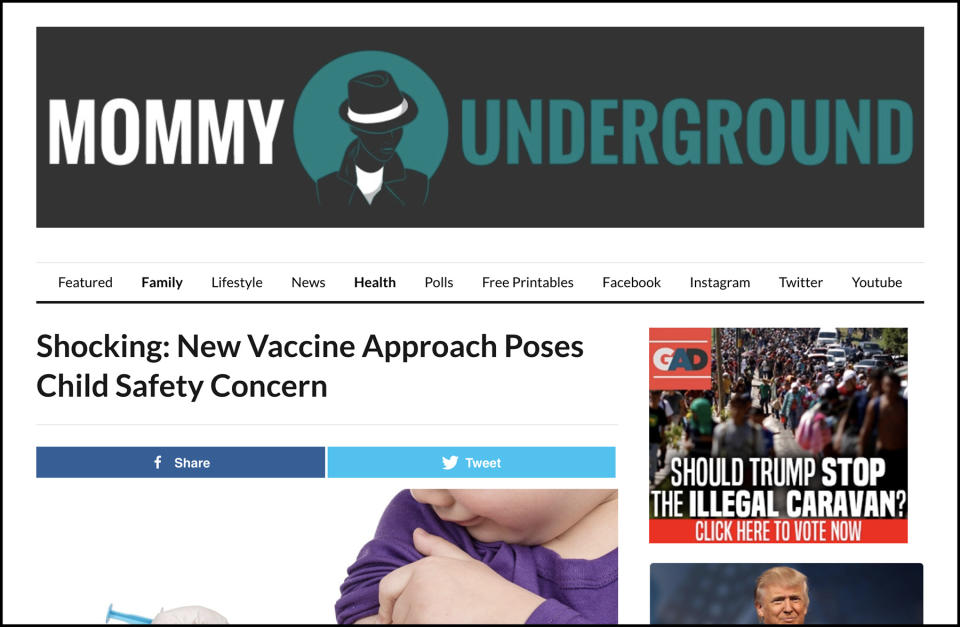
What is markedly different about these sites we've uncovered is they are run by marketing firms, groups that work for political campaigns and other businesses. In the case of Conservative Buzz, it even openly states on its website that the site is run by a marketing firm.
DedicatedEmails.com appears to have stopped running Google Ads on November 4th, the day we contacted the organization to comment on this article. By November 8th, Conservative Buzz, a website owned by DedicatedEmails.com and detailed in this article, had been wiped of all of its news content. Many of its surveys remain operational. DedicatedEmails.com has not responded to our request for comment.
Ascension Marketing Group was, according to business records, founded by Stefan Gleason, an active political donor, who has contributed the maximum amount allowed by an individual to at least three Republican candidates this year alone. Ascension has spent over $400,000 on more than 20,000 political ads through Google's ad platform.
Those visible on Google's ad library are branded with the logo of Liberty Headlines. The site publishes pieces by Gleason and others with headlines like, "Pocahontas Charts Wealth-Raiding Warpath to the White House," a reference to presidential candidate Senator Elizabeth Warren. The site Headline Health is also registered to the same North Carolina address, with Stefan Gleason at the helm.
Digital Communications LLC seems to be running the most extensive network of such media sites. The organization has spent considerably less on ads -- over $29,000 on 191 Google ads -- but has far more sites.
Digital Communications LLC was registered by lawyer David A. Warrington to an address in Virginia that is also home to Rising Media News Network, LLC (responsible for Conservative Revival, Freedom Health News, Survival Institute, Mommy Underground, Black Eye Politics, Proud American Traveler, Christian Life Daily, Deepstate Journal, Great American Wildlife, Liberal Propaganda Exposed, DC Swamp Tales, Better Change Project and 2020 Dirt Sheet), American Patriot News Network LLC, Great American Daily Press LLC, Off the Wire Network LLC, Americans for Life Inc. and Saber Communications, according to business records from the state of Virginia.
All of these sites and marketing companies are registered to the same address in the state of Virginia.
Saber Communications was founded by Michael I. Rothfeld and the company worked as part of the digital operation for Republican Senator Rand Paul's PAC. Rothfeld himself has run as a Republican for a Congressional seat and a State Senate seat representing Virginia and was the treasurer of the Pro-Life PAC as recently as 2016.
The Center for Responsive Politics' website opensecrets.org notes that Saber Communication's political clients in the 2018 cycle included America's Liberty PAC (Rand Paul's PAC) and the National Association for Gun Rights (NAGR), which is coincidentally also registered to that same Virginia address by Warrington, according to Virginia business records.
Warrington, who has served as the chairman of NAGR, was general counsel for Paul's 2012 campaign and was "counsel for the 2016 Trump Campaign to the Credentials, Platform, and Rules Committees at the Republican National Convention in Cleveland, Ohio".
The thing about emails
Emails are not only useful to be sold to campaigns or companies for direct email targeting. They're also useful for groups looking to advertise online.
Once a company has your email address or any personal information that can identify you online, it can continue to target you again and again.
For instance, if a company knows you're a bit of a swing voter (having shown affinity to candidates on either side of the aisle) and that you care a lot about animal rights or gun laws, with your email address, it can target custom ads at you about why a particular candidate or political party is the best when it comes to animal rights or the worst when it comes to gun laws.
With this approach, campaigns and marketers can more wisely spend their money, only focusing on those who've engaged with their content before or who seem susceptible to changing their minds in the future. This is a much more efficient way to spend campaign money than putting an ad on television where lots of people may see the ad, but there's no feedback about their reaction to it or how much they engaged with it, and it's difficult to precisely reach them again.
Politico describes Warrington as one of Rothfeld's protégés. The pair both worked for Paul's 2012 campaign, which suggests that Digital Communications LLC (which has very little presence online) and Saber Communications are at least ideologically linked, if not part of the same operation.
Michael Rothfeld and Saber Communications declined to comment for this story. David Warrington and Digital Communications LLC, Brian and Mike Litman and DedicatedEmails.com, and Stefan Gleason and Ascension Marketing Group did not respond to our request for comment after repeated attempts to reach them.
These groups all push conservative agendas of some stripe, though their tactics are not limited to conservatives. A similar network of Facebook pages tied to the group News for Democracy was uncovered in 2018 promoting liberal policies and ideas under the guise of news disseminated through social media. They spent hundreds of thousands of dollars on Facebook and Google ads.

"[Their ads] were targeted at conservatives, but then they were pumping in liberal messaging," Damon McCoy said about News for Democracy and the affiliated company MotiveAI. He's an Assistant Professor of Computer Science and Engineering at New York University and lead author on NYU's Online Political Ads Transparency Project.
This playbook is not new; it's exactly what we saw in 2016 from Russia, according to McCoy and his NYU colleague Laura Edelson.
The new rule book
"Advertisers are behaving as if this is just the new tactic that everyone believes to be effective," said Laura Edelson, a PhD candidate at New York University, also a lead author on NYU's Online Political Ads Transparency Project.
With platforms like Google, Twitter and Facebook now opening up their archives of political ads to the public, campaigns may be more inclined to outsource such efforts, not unlike how they often do with television and radio ads, contracting capable marketing firms to create and place. But unlike with television and print ads, it's not always clear from digital ads who is funding them or even what their ultimate goal is.
"You'll often see firms listed as spending on Google rather than the entity behind the actual advertisement," explains Anna Massoglia, a researcher at the Center for Responsive Politics. "That again creates a gap in disclosure, so unless you even watch the advertisement on Google, sometimes you don't know who the actual sponsor of the ad is. You just will see the firm or LLC that's being paid to purchase the ad."
And even then, it can be extremely difficult to know who's funding an ad, as it's not actually required for ad buyers to disclose who's paid for something when you click through from the ad to the final webpage.
Political ads according to Google
A further complication of these types of ads is that not all of them are necessarily documented on Google's ad platform. That's because what Google counts as political ads falls into a narrow definition:
"In the United States, election ads include ads that feature a current officeholder or candidate for an elected federal office, such as that of the President or Vice President of the United States, or members of the United States House of Representatives or United States Senate. Note that election ads don't include ads for products or services, including promotional political merchandise like t-shirts, or ads run by news organizations to promote their coverage of federal election campaigns, candidates or current elected federal officeholders."
Within these guidelines, large swathes of ads and content are not publicly cataloged by Google. These include ads that may move people politically, but focus on issues rather than specific candidates.
Google says it has yet to clarify with governments a definition of what constitutes an issue ad. Though, of course, the company could make this determination on their own as Facebook has done.
Speaking about the kind of content that was most widely used and most effective in 2016 -- issue-based content on topics like race and immigration -- Edelson explains that such ads "tended not to be the kinds of things that are included in, for example, Google's transparency archive."
"All ads that run on our platforms have to comply with our ads policies," a Google spokesperson told us. "We enforce our policies, and where ads are found to breach them, we take action. We are committed to bringing greater transparency to political advertising, and for political advertisers, we have additional requirements, such as verification of the advertiser, a paid-for-by disclosure and inclusion in our political ads Transparency Report."
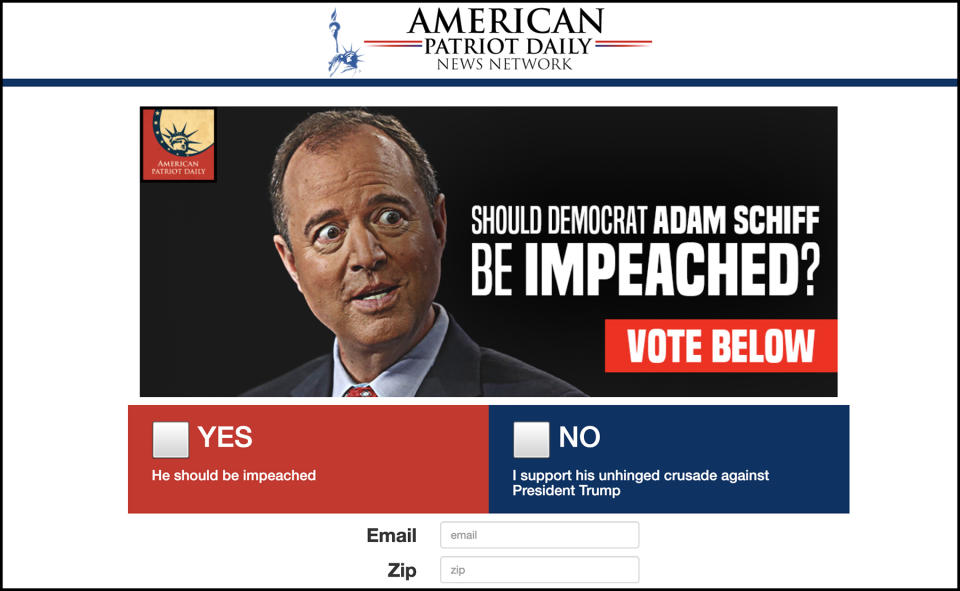
"The Federal Election Commission hasn't sufficiently addressed internet advertising," said Massoglia. She explains that ads telling people to 'vote for' or 'vote against' something or someone have to be reported if they run on television or radio. "If those ads are run on the internet they don't have to be disclosed to the FEC at all, and that's a pretty significant gap in disclosure since there's so much being spent there right now."
Over $120 million has been spent on political ads on Google since May 2018, which is as far back as Google's public ad archive goes. And that's just a slice of the pie, with an estimated total of $900 million spent on digital political ads in 2018, according to reporting by Axios.
For the types of companies we found in our research, it's nearly impossible to know who is funding them. We can't even rule out that the funders are foreign actors.
"They do have some verification processes for ad buyers to ensure that they're within the country," said Massoglia referring to Facebook, though the same applies to Google. "One way to get around those rules is simply to pay a middle man to act as the ad buyer, which is not uncommon, even beyond people who are trying to add extra layers of insulation between their identity and their spending."
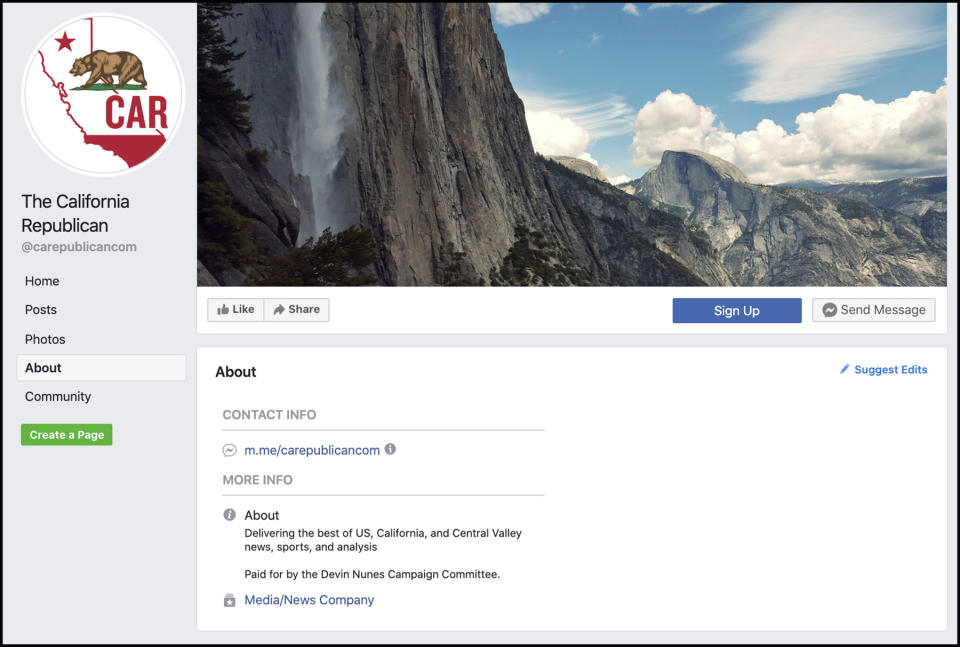
In other cases, some campaigns, Massoglia points out, have skipped the middle man and gone straight to setting up their own 'news' sites on Facebook, such as The Californian Republican run by the Devin Nunes Campaign Committee. Other faux local news sites have also been cropping up across the country.
Either way, it looks like political operatives masquerading as news sites and marketing firms amassing the email addresses of potential voters are signs of things to come for the 2020 election.


